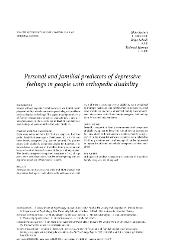| dc.contributor.author | Secinti, Ekin | |
| dc.contributor.author | Selcuk, Bilge | |
| dc.contributor.author | Harma, Mehmet | |
| dc.date.accessioned | 2019-06-27T08:01:27Z | |
| dc.date.available | 2019-06-27T08:01:27Z | |
| dc.date.issued | 2017 | |
| dc.identifier.issn | 2353-4184 | en_US |
| dc.identifier.issn | 2353-5571 | en_US |
| dc.identifier.uri | https://hdl.handle.net/20.500.12469/389 | |
| dc.identifier.uri | https://doi.org/10.5114/hpr.2017.65206 | |
| dc.description.abstract | BACKGROUND People with orthopedic disability experience limitations in physical ability which can cause psychological problems such as depressive feelings. This paper investigates the role of family environment caregiver characteristics and personal resources in the acceptance of disability and depressive feelings of persons with orthopedic disability. PARTICIPANTS AND PROCEDURE Data were collected from 161 Turkish people with orthopedic disability (mean age = 35.60 years SD = 10.18) and their family caregivers (e.g. parent spouse). The participants with disability completed scales for functional independence acceptance of disability family environment locus of control learned resourcefulness and depression. The family caregivers completed measures of social support their own depression burden of caregiving and acceptance-rejection of their care recipient. RESULTS Analyses via multivariate statistics and SEM showed that depressive feelings of individuals with orthopedic disability and their acceptance of the disability were predicted by multiple factors including the affected persons' learned resourcefulness and locus of control family environment and interactions with their family caregiver but not by their functional independence. CONCLUSIONS Overall a supportive family environment and acceptance of disability appear to lower the risk of having depression for individuals with orthopedic disability. Family caregivers' attitudes towards their care recipients were related to the family environment and feelings of burden appeared to impair the affected individuals' acceptance of their condition. | en_US] |
| dc.language.iso | eng | en_US |
| dc.publisher | Termedia Publishing House | en_US |
| dc.rights | info:eu-repo/semantics/openAccess | en_US |
| dc.subject | Orthopedic disability | en_US |
| dc.subject | Depression | en_US |
| dc.subject | Acceptance of disability | en_US |
| dc.subject | Family caregiver | en_US |
| dc.subject | Social support | en_US |
| dc.title | Personal and familial predictors of depressive feelings in people with orthopedic disability | en_US |
| dc.type | article | en_US |
| dc.identifier.startpage | 227 | en_US |
| dc.identifier.endpage | 239 | |
| dc.relation.journal | Health Psychology Report | en_US |
| dc.identifier.issue | 3 | |
| dc.identifier.volume | 5 | en_US |
| dc.department | Fakülteler, İktisadi, İdari ve Sosyal Bilimler Fakültesi, Psikoloji Bölümü | en_US |
| dc.identifier.wos | WOS:000417995900004 | en_US |
| dc.identifier.doi | 10.5114/hpr.2017.65206 | en_US |
| dc.institutionauthor | Harma, Mehmet | en_US |
| dc.relation.publicationcategory | Makale - Uluslararası Hakemli Dergi - Kurum Öğretim Elemanı | en_US |
















